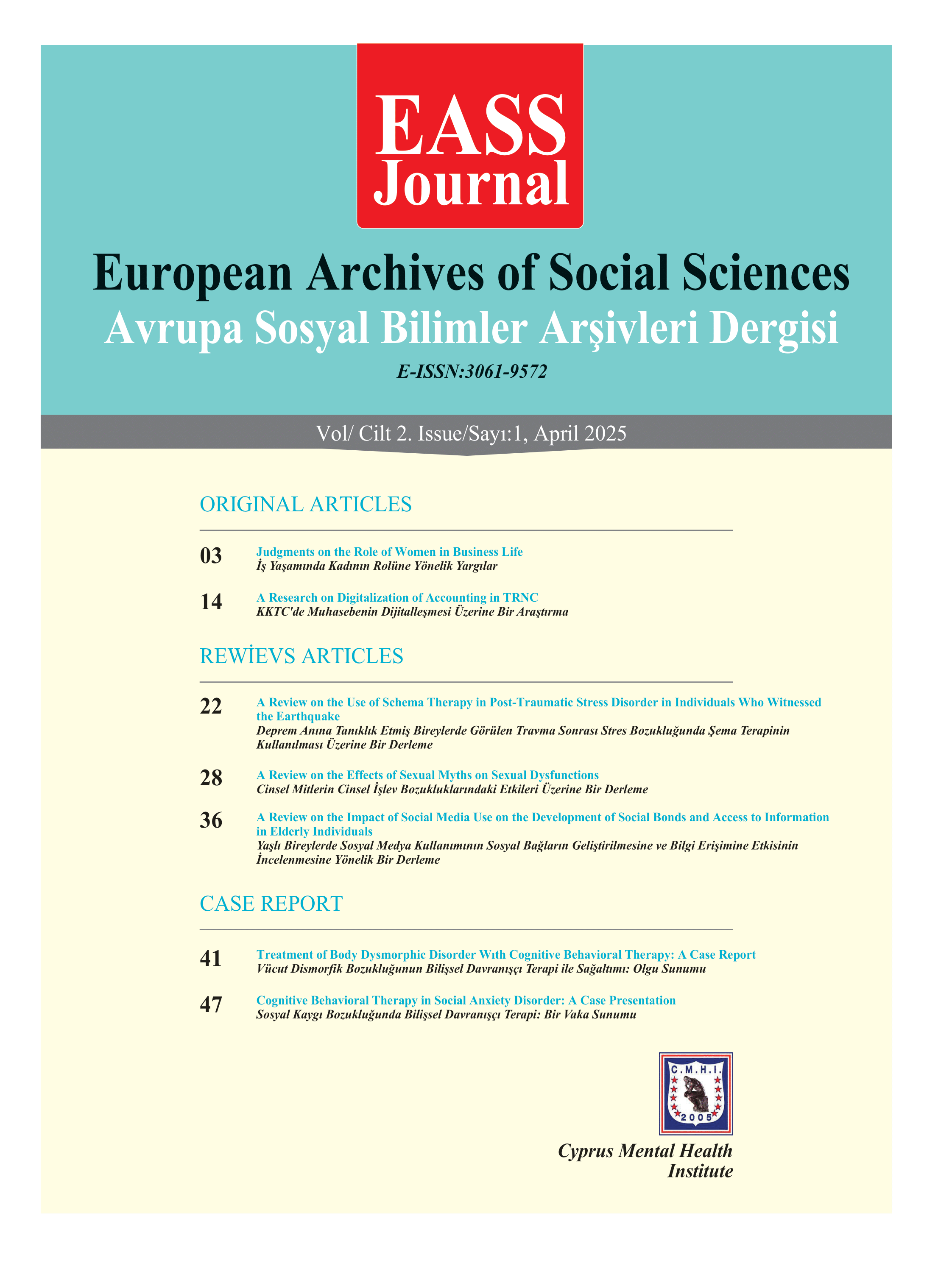A Research on Digitalization of Accounting in TRNC
DOI:
https://doi.org/10.35365/eass.25.2.02Keywords:
Accounting, Digitalization, TRNCAbstract
As technology advances, the business world changes at the same pace. In this age, which is seen as the age of technology, industrialization is inevitable and brings digitalization with it. Technology has become a constantly renewing cycle and it is impossible not to adapt to it. A correct and efficient strategy should be applied in adapting to changes so that success can be achieved. As in every field, the field of accounting has developed and changed by adapting to the developing and changing world. The branch of accounting, which we encounter in almost every part of the business world, is one of the most important occupational groups today. The purpose of this article is to examine the development and change of the accounting profession and practices, and also to predict how it will change in the future in this age where digital transformation is mandatory and is moving towards robotization.
References
Artık, M. B., & Arslan, E. (2024). “Muhasebe Bürolarinda Çalişan Muhasebe Meslek Mensuplarinin Dijitalleşmeye Bakişi” , Muhasebe ve Denetime Bakış, 24(72), 105-124,
https://dergipark.org.tr/en/pub/mdbakis/issue/84662/1370711.
Erol, M., Elagöz, İ. & Öztürk, S. (2012). “Tarih Boyunca Muhasebe Uygulama ve Eğitim Araçları” Muhasebe ve Finans Tarihi Araştırmaları Dergisi, (2), 221-232,
https://dergipark.org.tr/en/pub/muftad/issue/30127/325064.
Gökçek, L. G. "Asur Ticaret Kolonileri Çağı’nda (M.Ö. 1975- 1723) Anadolu’da Hayvancılık ve Hayvan Ticareti" Anadolu Arşivleri 7 (2004):59-78,
https://dergipark.org.tr/en/pub/aran/issue/47328/596884.
Göker, A. (2023). “Dijitalleşmenin Muhasebe Mesleğine ve İşletme Performansına Etkileri: Bir Uygulama Örneği” T.C. İstanbul Gelişim Üniversitesi Lisansüstü Eğitim Enstitüsü
http://acikerisim.gelisim.edu.tr/xmlui/handle/11363/4634.
Gökgöz, A. (2011). “Tarihsel Perspektifte Muhasebenin Doğuşunu ve Gelişimini Etkileyen Faktörler” Yalova Sosyal Bilimler Dergisi, 1 (1),
https://dergipark.org.tr/en/pub/yalovasosbil/issue/21785/615300 .
Limeng, S. (2012). “Luca Pacioli Zamanında Çin’de Muhasebe” Muhasebe ve Finans Tarihi Araştırmaları Dergisi, (2) , 179-197, https://dergipark.org.tr/en/pub/muftad/issue/30127/325066.
Özbek, A. (2024). “Muhasebe Mesleğinde Dijitalleşmenin Bağımsız Çalışan Muhasebe Meslek Mensuplarının İş Becerikliliği Üzerindeki Etkisi”, İşletme Araştırmaları Dergisi, 16(3), 1997-2008,
https://doi.org/10.20491/isarder.2024.1898.
Özdemir, Ö. (2023). “Perception Studies on Accounting Professions and Courses During The Covid-19 Pandemic: An Assessment”, Journal of Business Administration and Social Studies, 7(2), 92-107,
https://doi.org/10.5152/JBASS.2023.23010.
Yakut, M. Ş. (2024). “Muhasebe Mesleğinde Dijital Dönüşümlerin Çalışanların Motivasyonuna Etkileri”, International Journal of Social and Humanities Sciences Research (JSHSR), 11(109), 1358-1369,
https://doi.org/10.5281/zenodo.13147110.
Yücel, G. & Adiloğlu, B. (2019). “Dijitalleşme - Yapay Zeka ve Muhasebe Beklentiler” Muhasebe ve Finans Tarihi Araştırmaları Dergisi, (17), 47-60,
Downloads
Published
How to Cite
Issue
Section
License
Copyright (c) 2025 erdem Öncü, Burak Demir, Ahmet Yurteri

This work is licensed under a Creative Commons Attribution 4.0 International License.









 The journal is licensed under a
The journal is licensed under a 